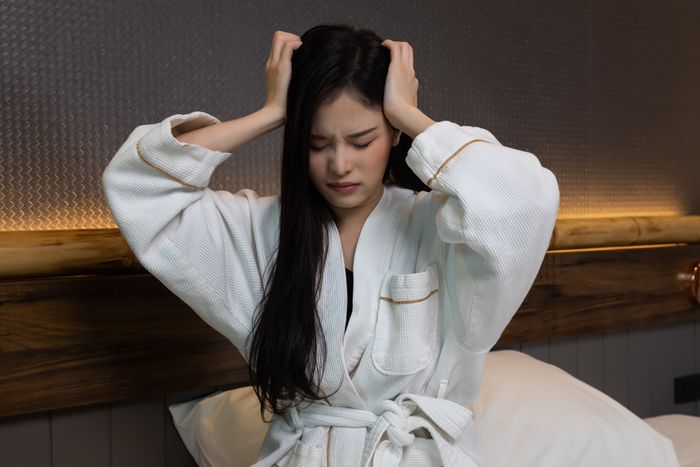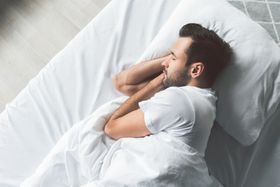Sleep Deprivation Headaches: What They Are and How You Can Relieve the Pain
Updated February 20, 2023.

It is believed that sleep deprivation is the cause of numerous deaths each year. While not necessarily the direct cause, lack of sleep can lead to other health and mood-related conditions (like heart disease and depression) and dramatically lower your awareness, making you more susceptible to fatal accidents.
Contrary to popular belief, only a minuscule (~3%) portion of the adult population can function normally and without side effects on less than 6 hours of sleep each night. Most of the rest of the population requires anywhere from 7-9 hours to avoid being sleep deprived. If you want to learn more about this topic, read 6 Signs You Are Sleep Deprived and What to Do About It.
No two people are the same, which means you could experience any and all of the potential side effects of sleep deprivation. This article looks specifically at headaches caused by lack of sleep, why this occurs, what they feel like, and what you can do to treat them.
How Does Sleep Deprivation Cause Headaches?
Sleep deprivation (and, interestingly, excessive sleep) has been linked by research to various types of headaches. Sleep has a restorative function on the body and mind, which is believed to be the reason that a lack of sleep can cause headaches. Though most scientists aren't entirely sure why, the predominant theory is that sleep disturbances interrupt vital periods of the sleep cycle, which could trigger the release of proteins that cause migraines and lower an individual's resistance to pain. Despite extensive research, only one study was found that suggested this to be true.
All that we are sure of is that a link does exist between headaches and sleep deprivation where both can be causal of each other.
It also stands to reason that certain sleep-related conditions, such as excessive teeth grinding, can put stress on the head and lead to headaches.
What a Sleep Deprivation Headache Feels Like: Migraine vs. Tension
Although various types of headaches are caused by sleep deprivation, the two primary ones are tension headaches and migraines. Although caused by similar factors, the symptoms of these sleep-deprived headaches differ dramatically.
Migraines
Migraines are far more severe than tension headaches and are characterised by dizziness and pain, usually on one side of the head or behind the eyes, that can last days in extreme cases and be so intense that it might lead to secondary effects such as nausea and vomiting. Additionally, migraines typically cause weakness to light and sound.
Tension Headaches
Not nearly as severe as migraines, being tired can also cause tension headaches that are milder than migraines and classified by a dull ache, heaviness, or pressure in the forehead or back of the head. Tension headaches usually only last a few hours and don't trigger a sensitivity to light and sound.
Treatments for Sleep Deprivation Headaches
Treatments for migraines and tension headaches usually differ. Research has found most tension headaches to be relieved with simple over-the-counter (OTC) pain medications or other conservative treatments. In contrast, migraines are far more difficult to treat.
Treating Tension Headaches
Aside from basic analgesics (pain medications), some other remedies for lack-of-sleep-induced tension headaches include:
- Applying a cold pack to the forehead This can restrict blood flow to the brain, which can help to ease some pressure and relieve the pain.
- Drink a glass of water Although dehydration might not be the cause of your headache, it can definitely make the symptoms worse. Drinking a glass of water might bring you some relief.
- Gentle massage Massaging the forehead and temples in slow and circular motions can potentially help relieve stress.
Treating Migraines
Medications for migraines are generally more potent than those used for tension headaches and can even include opioids and muscle relaxants. Aside from this and the methods discussed for treating tension headaches, some further treatment options include:
- Darkness, silence, and rest When migraines attack at debilitating levels, sometimes the only thing you can do to relieve them is to shut yourself in a dark, cool room with the curtains drawn, earplugs in your ears, and try to get some sleep.
- Acupuncture If you can manage to get yourself to a professional, studies have shown that acupuncture can help relieve some symptoms of migraines, such as nausea.
Preventing Sleep Deprivation Headaches
Sometimes, the best way to ease the pain of headaches when you are tired is to prevent them from occurring in the first place, and the simplest way to do this is to improve your sleep quality or fix your sleep schedule.
Aside from this, there are some other preventative measures you can take, such as:
- Natural sleep aids There are a host of dietary and supplementary choices you can make - from melatonin to magnesium to Cannabotech's M2CBD-formula products - to improve the quality of your sleep.
- Regular exercise Exercising regularly can trigger the release of endorphins beneficial in pain management and sleep quality. This is true for aerobic exercises like jogging as well as calming exercises like light yoga.
- Avoid certain foods Poor quality and processed foods, as well as alcohol and sugary delights, can lead to inflammation build-up in the body, which can both trigger and exacerbate migraines.
When Should You See a Doctor for Headaches From Lack of Sleep?
Although there is no definitive answer for this, a good rule to live by is that if you regularly experience headaches from not sleeping even after trying the abovelisted methods for relieving pain and improving your sleep quality, then you likely have a chronic sleep disorder that needs expert medical attention.
Consulting your doctor can help you get on the right track to dealing with your sleep issues and curing your insomnia headaches as they can refer you to specialists and prescribe you certain medications that you can't purchase otherwise.







